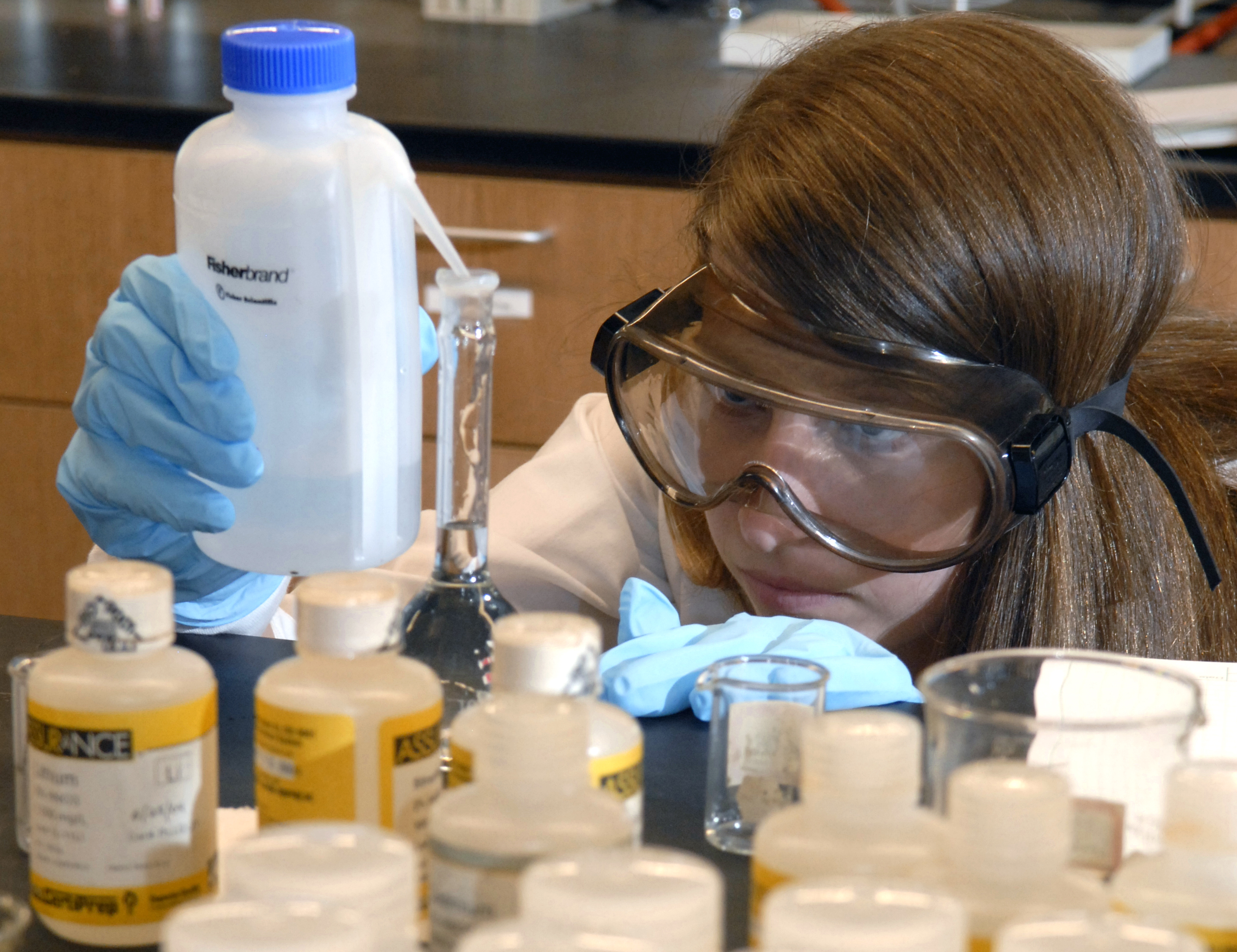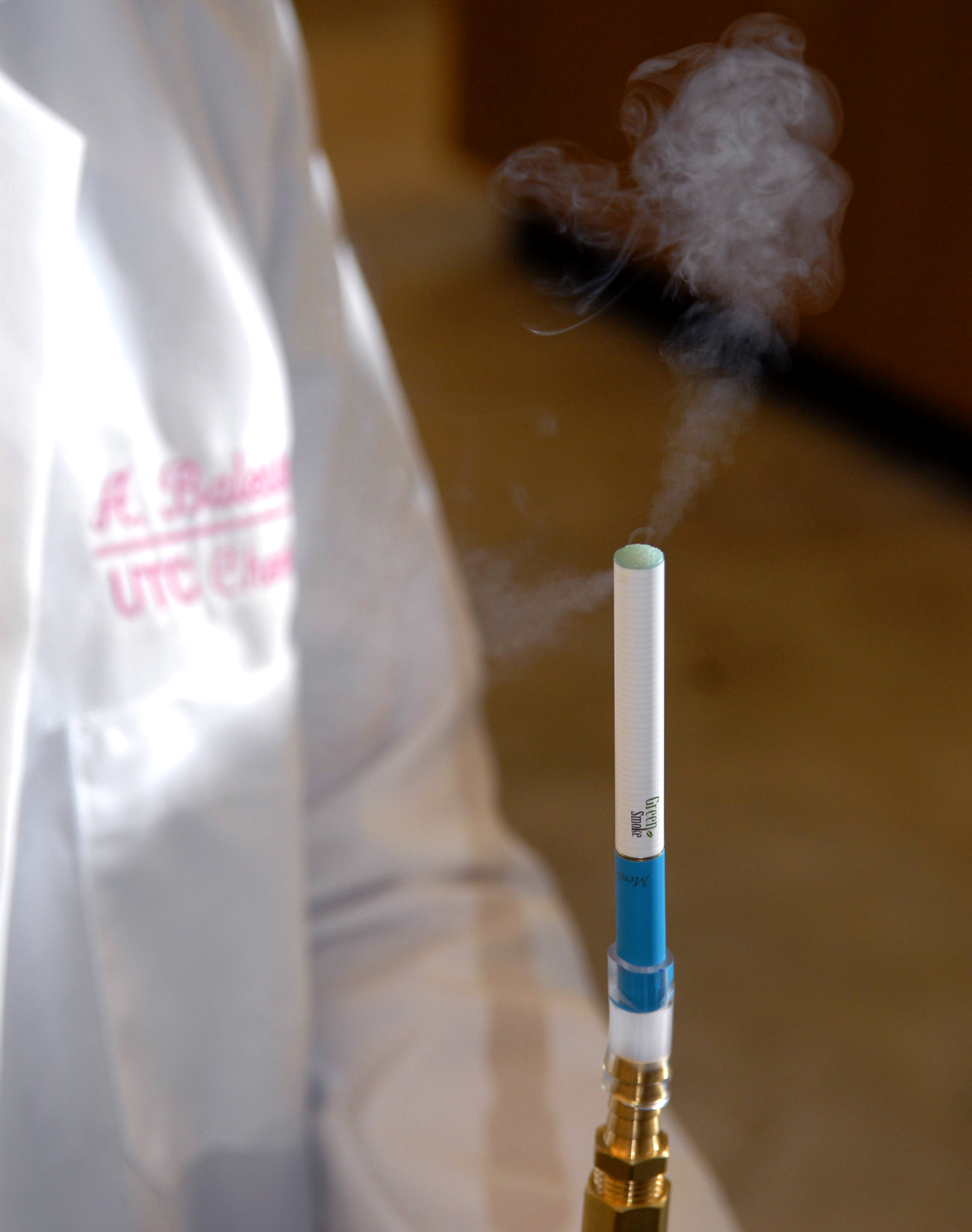For $14.95, a smoker can buy 500 puffs in a single electronic cigarette.
A USB cable makes it electronic - just like an iPod, users can charge its lithium battery in the middle of paper writing, Amazon surfing, Facebooking.
"Smoking" includes no matches, tobacco or secondhand breath, only a nicotine mist waiting to be inhaled and a tar-free, odorless vapor.
Finally: E-cigarettes glow in the dark - red, green and blue.
Sounds clean and cool, according to University of Tennessee at Chattanooga associate chemistry professor Gretchen Potts and a student researcher, but they're finding tobacco users' newest product is neither clean nor cool as they investigate e-cigarettes - something the U.S. Food and Drug Administration hasn't done thoroughly, they said.
UTC student learning how cigarette butts affect plants
The chemistry professor's question is odd but relevant: "What's in the butt?"Building off a study that found 12 metals lingering inside the final remnant of a cigarette, University of Tennessee at Chattanooga associate chemistry professor Gretchen Potts and a student are looking into how 4.95 trillion littered cigarette butts affect plant growth worldwide. The figure comes from a research paper that Potts co-wrote.As part of her "Plants Grown in an Ash Tray" undergraduate thesis, Chattanooga native and UTC senior Katie Thurman has stuffed the soil around pea plants with full cigarettes and cigarette butts, investigating whether butts transfer toxic metals to edible vegetation.Among other metals, Potts found aluminum, lead, nickel and titanium within cigarette butts during a recently published study.In the lab, Thurman has been "digesting" pea plant samples in a way that simulates the human stomach. Using acid, she's broken down several plants into a clear solution with microscopic pea plant flecks dotting the surface."It was fun watching it digest," she said. "Nothing happened for five or 10 minutes, then all of a sudden it melted down."This summer, she'll analyze the results and identify compounds. She plans to present her findings at a research symposium at UTC in July.Much of the research focuses on bioaccumulation."Let's say microorganisms get whatever is in the butts, and it affects them but doesn't quite kill them," Potts said. "Something else eats that, something else eats that, a fish eats that, we eat the fish."As an example, she cites mercury in fish."That's what happens with mercury," she concluded. "It all works its way up the chain."
"People don't even know what's in them," said Amy Balestrino, a senior chemistry major at UTC doing the research. "They jump on the bandwagon without knowing anything."
Devon Jay, a spokeswoman for SS Choice, an online e-cigarette retailer, said her company plainly lists ingredients and benefits - "no smoke, smoke anywhere, save money, no burns, no ashes" - on its website, which also includes smiling college students offering endorsements.
"I don't think we encourage anyone," Jay said by phone from Colleyville, Texas. "We're in business to provide an alternative to someone smoking tobacco cigarettes."
Despite a 2009 FDA sampling that found detectable levels of nitrosamines - cancer-causing compounds found in tobacco - in two brands of e-cigarettes, the agency recently announced it would not appeal a U.S. Court of Appeals decision stating that e-cigarettes "are not drugs/devices unless they are marketed for therapeutic purposes."
An FDA memorandum dated April 25 promises to develop a strategy to regulate this "emerging class of products" as tobacco products under the Family Smoking Prevention and Tobacco Control Act, which would allow the FDA to require ingredient listing, user fees and "misbranding provisions," among other controls.
But as of now, e-cigarettes are unregulated, meaning no federal age limit.
Jay, the SS Choice spokeswoman, said the company verifies that each online buyer is 18 or older but said she's "not familiar" with how that process works.
Jeff Ventura, an FDA spokesman, said "there's no definitive timeline set up for regulation yet."
"Anyone in the regulatory world knows it's going to take a while," he said. "There's just not a lot of information out there about e-cigarettes one way or another."
Smoke signals at UTC
Balestrino wants to change that, using the means at her disposal.
In lieu of a $35,000 "smoking machine" - which is what big labs normally use to test cigarettes - Potts rigged a plastic squirt bottle to simulate the inhalation of an e-cigarette.
"We have the power of the student," Potts joked. "A smoking machine can hold up to 100 cigarettes, but I have my one student working every day, squeezing the bottle."
When Balestrino applies pressure, the bottle "breathes in" the contents of the e-cigarette and a cotton ball absorbs them. After testing dozens of brands, she and Potts plan to investigate the cotton balls with something a bit more high tech - mass spectrometry and plasma machines - to identify ingredients.
"We're going to extract from the cotton everything that comes out of the e-cigarette," Potts said.
While research only began last week, early results are rolling in. Most e-cigarette companies claim their products are made of only two compounds - nicotine and propylene glycol, the liquid that hosts the addictive stimulant.
But when Balestrino tested two replacement solutions for reusable e-cigarettes, she instantly found 2-butanol, which Oxford University classifies as an irritant that "may be harmful by inhalation, ingestion or through skin absorption."
Balestrino said she plans to publish results by July, when she'll present her research at an undergraduate symposium at UTC.
Jay Collum, a tobacco education and control coordinator at the Chattanooga-Hamilton County Health Department, said the results couldn't come any more quickly.
"I have no knowledge of any such e-cigarette regulation here, state or city," he said. "With these things, you get your nicotine and you get it anytime you want to."
Contact Chris Carroll at ccarroll@timesfreepress.com or 423-757-6610.

